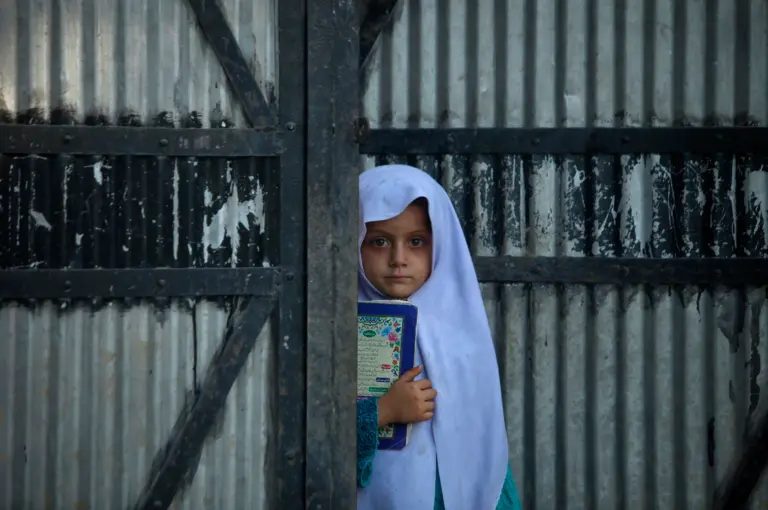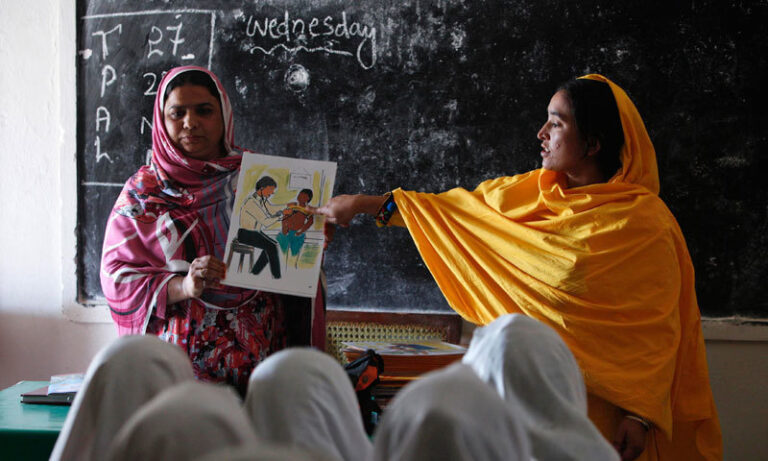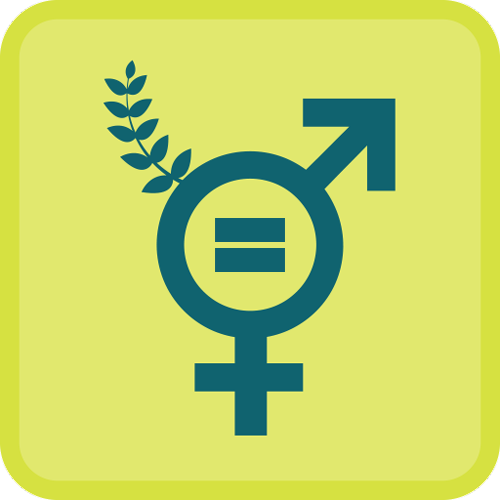Enhancing Women’s Leadership for Sustainable Peace in Fragile Contexts in the MENA Region
By PeaceLab2016 editorial team, BMZ
On 13 December 2016, the German Ministry for Economic Cooperation and Development (BMZ) and UN Women hosted an expert discussion on opportunities and challenges in enhancing women’s leadership in crisis prevention and peacebuilding with a particular focus on the MENA region. The one-day workshop was held in Berlin.
The workshop marked the launch of a new partnership program between the German Ministry for Economic Cooperation and Development (BMZ) and UN Women, drawing connections between United Nations Security Council (UNSC) Resolution 1325, peacebuilding efforts on the ground, and the new German guidelines for crisis engagement and peacebuilding. Representatives of UN Women, the German Federal Government and implementing agencies, the German parliament, academia, think tanks, and civil society actors discussed the findings of the 2015 Global Study on UNSC Resolution 1325 and ways of implementing its recommendations. As part of the debate on the new German guidelines, the discussants developed several recommendations to incorporate the agenda on women, peace, and security in the new German strategy document.
In an introductory discussion, participants highlighted that the Women, Peace, and Security Agenda was critical, yet an under-utilized tool for preventing and responding to conflicts. This was said to be even more surprising in the light of evidence that the more influence women had on peace processes, the more likely it was that there would be a peace agreement, that it would be implemented, and that it would be sustainable. As fundamental human rights, they argued, women’s rights should play a priority role in conflict prevention efforts by international actors. More attention needed to be paid to gender equality indicators, as research suggested that countries with higher levels of gender equality were less likely to resort to the use of force. Women’s participation in social, political, and economic decision-making processes needed to be supported and sustained also after the end of conflicts and required international support of grassroots women’s movements beyond elite representation to build inclusive partnerships and trust. The experts further stressed that while women and girls ought not to be reduced to the role of victims, it had to be recognized that violence, including against women and girls, did not stop with the end of conflicts. Structural changes were needed to transform discriminatory gender norms and to overcome violence as a means of resolving political, social, and domestic conflicts. Mainstreaming gender sensitivity in programs supporting economic and political recovery was therefore a must. In addition, dealing with traumata and support to women’s role in transitional justice and reconciliation efforts should therefore be actively included in peacebuilding efforts on the ground.
With a view to the MENA region, discussants underlined that efforts to counter violent extremism should not replace the Women, Peace and Security Agenda in the region, nor should the protection of women’s rights be exploited for military purposes. Instead, the international community should push every country in the MENA region to develop and implement a national action plan regarding UNSC Resolution 1325.
The discussants called on the German government to make UNSC Resolution 1325 a cornerstone of the new German guidelines for crisis engagement and peacebuilding and to mainstream gender equality throughout the document. Germany, they said, should make a strong political commitment to UNSC Resolution 1325 in the guidelines, promoting women’s and human rights, supporting women in decision-making processes, and preventing violence against women in conflict and post-conflict contexts. Additionally, Germany ought to prioritize the promotion of the Women, Peace and Security Agenda in its candidacy for UNSC membership in 2019/20 and should reflect UNSC Resolution 1325 in the parliamentary mandates for the German Bundeswehr in peace operations.
After discussing the findings and recommendations of the 2015 Global Study on UNSC Resolution 1325, participants split up into three expert working groups to take a closer look at selected aspects of the Women, Peace, and Security Agenda with a view to making recommendations for the new German guidelines and inspiring the new partnership program between BMZ and UN Women.
Getting beyond “one woman at the table”
The first working group developed recommendations on how third-party support could promote effective women’s inclusion in track 1 peace processes beyond a token “one woman at the table” by creating an enabling environment. According to the expert group, policymakers needed to address the topic of women’s inclusion in decision-making and society from a long-term perspective instead of only focusing on representation in eventual peace talks. In the new guidelines, Germany should commit itself both to the values of the Women, Peace, and Security Agenda as well as to the Sustainable Development Goals, which were said to provide a suitable framework for identifying long-term goals of inclusion. The working group highlighted gender quotas as one of the central instruments in empowering women. This should be implemented not only with regard to peace negotiation teams, but also with other government delegations, state institutions, and the security sector. The international community should put more pressure on countries, including in the MENA region, to introduce gender quotas.
A key challenge in overcoming gender inequality in track 1 peace processes lies in dealing with the resistance of the warring parties to share power and influence with women and other (especially civil and non-armed) groups, according to discussants. Men (and women who have access to decision-making), who are in principle in favor of giving political space to women in peace processes, should be encouraged and supported to promote women’s participation, and if necessary should be safeguarded from adverse social and political pressures. In addition, the German government should guarantee the physical, political, and reputational protection of women representatives and should develop tools for managing risks to them. A good understanding of political and cultural sensitivities was crucial in this respect, participants stressed.
At the same time, international actors themselves must do their homework to overcome gender inequality, participants said. For example, they should improve female representation in their own delegations and encourage male-female co-moderation in all political and peace missions. International actors could also improve the accessibility of talks for women with regard to visa and cultural barriers and improve their own capacity building for diplomats and staff by incorporating women’s inclusion and gender sensitivity in standard personnel training. In order to monitor international efforts in promoting gender equality and documenting lessons learned, mechanisms for debriefing and cross-learning of missions, including through gender advisors, should be developed. In particular, experiences with different ways of institutionalizing women’s inclusion should be monitored and evaluated. The case of the exclusive Women’s Advisory Board in the Syrian process and the integration of women in the Afghan High Peace Council were discussed as two examples.
In addition, it was argued that more knowledge was required on the effectiveness of quotas, national action plans, and other instruments that aim at mainstreaming gender equality in the area of political participation of women.
The discussants also underlined the need to develop a communications strategy addressing both women in their political and societal environment as well as the international community and their home audiences, as this was important in order to explain women’s inclusion in a context-sensitive way. Third-party actors ought to work with and through the media (also on social media), ensure transparency about mandates, and carry out expectation management. The latter was supported by experiences from Afghanistan, where public communication at times impeded women’s inclusion.
Furthermore, the expert group highlighted that the important role of women needed to be recognized and strengthened across all tracks of peace processes – thus establishing a link to working group 2 (see below).
Considering the current challenges in the MENA region, the participants argued that governments should empower women refugees and ensure women’s participation in diaspora representation. Last but not least, the working group identified women who were previously involved in violent extremist groups as a new challenge to national and international efforts in the MENA region. They argued that more learning was needed on how to deal with and involve female ex-combatants in post-conflict situations.
Creating effective multi-track engagement for women
The second working group focused on how to involve women in all peacebuilding tracks and how to facilitate meaningful connections between official (“track 1”) talks and women peacebuilders on track 2 and track 3. The discussants pointed out that women were often skilled in relationship-building, something that is of specific relevance in peacebuilding processes. However, they also emphasized that women should not be considered a homogeneous group, sharing the same interests. Instead, in order to benefit from the real value of participation and to avoid creating divides between elite and non-elite women, diversity needed to be reflected in multi-track engagement, going beyond women from elite groups or formal NGOs and also involving ordinary local women or youth whose voices are rarely heard in actor networks.
Identifying strong but not very visible women networks in societies and building partnerships with them required special attention by international actors, as the voices of disadvantaged or underprivileged women were often more difficult to hear and understand, discussants remarked. Some participants highlighted that international actors such as Germany should move out of their comfort zone in order to involve actors beyond like-minded groups in peacebuilding efforts on the ground, for example, female ex-combatants.
The discussants stressed that context, cultural, conflict, and gender sensitivity as well as a long-term approach had to be ensured for inclusive and local-led peace processes. This required flexible funding schemes focused on women’s involvement in peace processes, as well as differentiated knowledge of the landscape at all levels with regard to specific conflict contexts and actors, and the impact of violence on women and women groups’ interests.
In addition, participants called for more active sharing of insights and knowledge between international and national civil society groups and state actors to increase effective multi-track engagement of women. Creating more opportunities for peer-to-peer learning and networking in the region was recommended.
Furthermore, the special protection needs of women who work in peacebuilding were stressed. Not only did these women maintain a high level of involvement – due to the special attention they gained, they often put themselves and their families at risk – especially in a fragile post-conflict context. These women needed special support and attention, as well as room for recovery.
Participants of the working group argued that international actors should continue the dialogue with conflict-affected countries at a track 1 level, and uphold political pressure and pressure to implement UNSC Resolution 1325 and other obligations, including through conditionality of funding.
Dealing with the past and working toward a better future
The third working group discussed how peace processes could foster reconciliation and justice in light of women’s rights violations and sexual and gender-based violence (SGBV).
The experts emphasized that experiences of violence, including SGBV, and reconciliation were highly political and very personal at the same time. External stakeholders needed to be aware of the space and time required to deal with what happened at the societal and personal levels. Pushing for reconciliation too forcefully might have negative implications. For example, the needs of the women whose rights had been violated might be disregarded once more, or remaining grievances from past conflicts that had not yet been appropriately dealt with might be ignored over calls for a settlement of the most recent conflict, thus establishing unhelpful hierarchies between survivor, but also perpetrator groups. This was also why including women and other survivors of violence in conceptualizing and implementing reconciliation strategies was argued to be so important. Furthermore, given that personal recovery might not fit into existing project cycles, a long-term perspective and engagement on dealing with SGBV, reconciliation, and justice were needed – and as experiences from the Balkans or Latin America had shown, this might well mean that support was needed for generations to come.
The discussants also emphasized that dealing with traumatic experiences of violence against women had to be seen in conjunction with the overall situation women and girls were facing. Specific psychosocial and trauma support work was important, but at the same time, women needed to be granted access to political, social, and economic decision-making and opportunities. They needed to be able to live a life free of violence and discrimination. This ought to be considered when designing post-conflict strategies, including political and economic reconstruction or justice and security sector reforms. Furthermore, the psychological aspects of violence against women should be taken into account when capacitating national and local institutions such as the administration, medical providers, police, or the courts to engage with survivors of violence in a respectful and gender-sensitive manner.
The experts highlighted that the documentation of SGBV, women’s rights violations, and other types of violence (against women and men) as well as the work with survivors (and potentially also with perpetrators) required a high level of technical expertise, but also gender, cultural and conflict sensitivity. Expectations needed to be managed, and physical but also emotional risks for those collecting the data and for the survivors and witnesses of violence had to be kept to a minimum. This could be particularly challenging in situations when a plethora of humanitarian aid providers came into a conflict context, bringing with them different approaches and quality standards, and usually pulling out after a few months.
This is why discussants emphasized once more that international actors had to act and react in a context-specific way; they ought to have technical gender expertise, as well as a good knowledge of local needs, languages, and traditions, and should engage with appropriate existing local processes. Therefore, sufficient time and resources must be made available to guarantee high-quality standards, including those regarding context and gender analysis.
In their closing remarks, representatives of the BMZ and the Foreign Office recognized the relevance of making a clear commitment to the Women, Peace, and Security Agenda and its links to Agenda 2030 and particularly SDG 5 in the new German guidelines for crisis engagement and peacebuilding. They acknowledged that peace processes needed to go beyond just stabilizing a conflict context by going back to what used to be before the war, and instead to have the ambition to transform societies and make them more peaceful, fair, and just – also with regards to gender norms and roles. But they also emphasized that this can be challenging at times. Careful and creative thinking and programming, including from the donors’ side, were required to be better equipped to overcome resistance to women’s inclusion in peace processes; to think holistically and long-term, and to bring the communities working in sectors such as women’s participation, stabilization and reconstruction, and development together rather than working in silos; and to invest in flexible, smart and strategic support and expertise to strengthen local women’s organizations.





